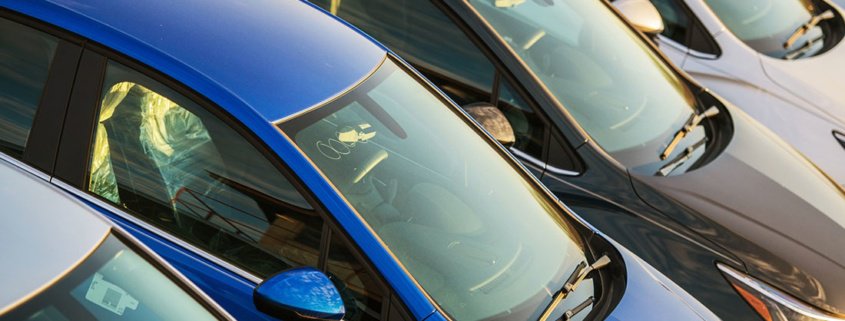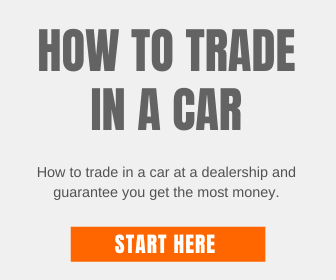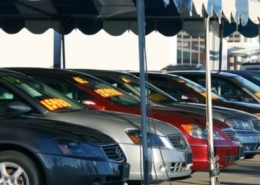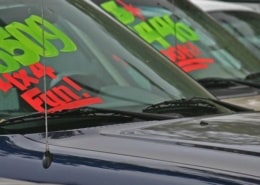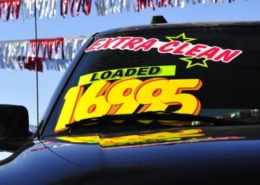How to Buy a Used Car in 2024 – Used Car Buying Cheat Sheet
Step-By-Step Used Car Buyer’s Guide
Buying a used car instead of a new car has its advantages. First, someone had already taken the enormous initial depreciation loss on the vehicle when they purchased it as a new car. Second, you can buy a used car just a couple of years old, with a lot more bells and whistles, for a lot less money.
No factory invoice is associated with a used car, so you must estimate what a dealer paid for the vehicle. Other than that, it would be best if you took only a couple of additional steps to ensure you don’t end up buying an unreliable car or someone else’s problem. My used car buyer’s guide will take you through the process step-by-step.
Table of Contents
How to Buy a Used Car
If you went used car shopping back in the day, you started with the local newspaper or drove from lot to lot, ultimately having to decide between a handful of vehicles.
Once you found the one you liked, you had to make a snap decision to spend several thousand dollars.
Talk about STRESSFUL while trusting you didn’t get ripped off and hoping the car you’re buying is reliable!
“INFORMATION IS POWER”
Today’s consumer has so much information available to them. This information, used correctly, makes the used car buying experience fun and far less stressful.
For over two decades, I’ve helped friends, family, and thousands of readers save money when buying a used car.
My step-by-step used car buying guide combines this modern-day information and my years of experience in the car business to guarantee you get the best deal possible and avoid car dealer scams.
Let’s get started.
1) Begin the Used Car Buying Process Online
Today you can do 95% of your used car shopping online. You will still need to visit the dealer to inspect and test drive the vehicle visually. However, most of your pre-shopping can be done right from the comfort of your computer, tablet, or smartphone.
Car dealers know bright car buyers shop online; they also understand that if they compete with other dealers in the area, they must post their used car inventory online for sale.
There are several million used cars for sale online. Used car listing sites make it easy to cast your net far and wide and narrow down your search parameters to find the exact vehicle you’re looking for within minutes.
Recommended Used Car Shopping Sites
 RydeShopper will find used car clearance prices in your local area. Their extensive dealer network will assist you in locating your next used car. To optimize your savings, choose all of the dealerships in your area.
RydeShopper will find used car clearance prices in your local area. Their extensive dealer network will assist you in locating your next used car. To optimize your savings, choose all of the dealerships in your area.
 Edmunds is one of the Internet's oldest used car research and reviews sites. You're sure to find a good deal on a used car among the hundreds of thousands of vehicles listed online.
Edmunds is one of the Internet's oldest used car research and reviews sites. You're sure to find a good deal on a used car among the hundreds of thousands of vehicles listed online.
 MotorTrend is a division of MotorTrend Magazine and one of the best-kept price quote secrets on the Internet. They have dealer relationships all over the country. Use their simple car price quote service to find your next used car.
MotorTrend is a division of MotorTrend Magazine and one of the best-kept price quote secrets on the Internet. They have dealer relationships all over the country. Use their simple car price quote service to find your next used car.
 CarsDirect has been in operation for over a decade. Their search tool makes finding the exact car you're looking for simple. Simple search and navigation will assist you in narrowing down your options to the ideal vehicle.
CarsDirect has been in operation for over a decade. Their search tool makes finding the exact car you're looking for simple. Simple search and navigation will assist you in narrowing down your options to the ideal vehicle.
2) Check a Used Car’s Past History
In my opinion, this is the most important thing you can do when buying a used car. There is an added cost, but I promise you, it’s well worth it.
While shopping online, if you see a vehicle, you’re interested in purchasing. Check the vehicle’s history by its VIN before spending more time on it for any car you’re interested in.
I’ve seen many people buy a used car only to bring it back a few days after finding out it’s been in an accident or flood. Good luck talking a dealer into letting you out of the deal; you agreed to buy the car “as-is where-is.”
It would be best to do your due diligence first; it’s too late after you sign the paperwork.
Altogether avoid this nightmare by reviewing a vehicle’s history upfront as you’re shopping and comparing cars. You only need the 17-digit vehicle identification number to get a vehicle history report.
Dealers know that potential car buyers will use the posted VIN to get a vehicle history report online.
If the VIN is not available, the seller is hiding something, do not buy the car and move on to the next one.
Additional tips about vehicle history reports:
- Several options are available to you regarding vehicle history report companies on the web; some are better than others. I’ve personally used several of these companies and have pulled thousands of vehicle history reports in my career, and I have always preferred using AutoCheck.
- For consumer use, I recommend the AutoCheck Multiple Report Plan; it allows you to run
- 5 AutoCheck® vehicle history reports for 21 days, making it the best value for the money. This gives you plenty of time to research and inspect the history of as many cars as needed before making a final decision. Most major auto auctions and lenders use AutoCheck over their competitors because they accurately disclose vehicles that have been rebuilt or branded with frame damage.
- It doesn’t matter if you’re looking at a used or certified pre-owned car. I recommend you spend a little money and thoroughly inspect any used vehicle you’re considering. By doing so, you’re decreasing your chances of buying an unreliable car. Remember that a dealer doesn’t want to be stuck with a lousy car any more than you do.
- Read my complete vehicle history report guide to learn more about their information.
3) Arrange Used Car Financing
During the car buying process, most people are more worried about getting the “lowest price” than about the financing portion of the deal. As with buying a new car, you should have a pre-approved used car loan before visiting a dealership.
There are differences between new and used car loans. Interest rates for a used car loan typically run anywhere from 1-2% higher than the rate for a new car.
Depending on the age and mileage of the vehicle, a lender will raise the interest rate or shorten the loan term to decrease their risk. To make matters worse, most banks will not finance a used car over five years old.
You can check rates with your local bank or credit union. You will want to apply with well-known online companies specializing in and understanding the used car market to get the best rates and terms.
Recommended Auto Loan Sites
 myAutoloan will shop for the best loan rates for you. You submit one free, no-obligation car loan quote through their secure website, and within seconds you'll receive up to 4 loan offers from their auto lending partners.
myAutoloan will shop for the best loan rates for you. You submit one free, no-obligation car loan quote through their secure website, and within seconds you'll receive up to 4 loan offers from their auto lending partners.
 Auto Credit Express was founded on June 1, 1999. If you have bad credit, no credit, or have been turned down for an auto loan because of a low credit rating in the past, Auto Credit Express can help.
Auto Credit Express was founded on June 1, 1999. If you have bad credit, no credit, or have been turned down for an auto loan because of a low credit rating in the past, Auto Credit Express can help.
4) Negotiate a Used Car’s Price
Most people get discouraged during the negotiation part of the car buying process. You’ll have nothing to worry about if you are prepared and have the information upfront.
Used cars do not have an invoice. This makes it almost impossible for someone to know what a dealer paid for a vehicle.
Along with not knowing how much a dealer has in a specific car, the used automobile market changes direction practically every day. So what can you do? You can calculate how much money a dealer should have in the vehicle and negotiate from there.
Once you receive the information on the car you want to buy from the listing sites above, you will want to estimate what the dealer paid for the used car.
When negotiating a used car’s price, your goal is to purchase the vehicle as close to or under the trade-in value. Buying the car within this range will keep you from overpaying for the vehicle and allow you to rest easy knowing you got a good deal.
5) Shop for a Used Car Extended Warranty
When you buy a used car, you typically buy it “as-is where-is” unless the vehicle has any remaining manufacturer’s warranty. If the car has no warranty left, you will be responsible for any repairs the vehicle incurs.
Always check the car’s age and mileage to see if the manufacturer’s warranty has expired.
Dealers have massive markups on the extended warranties they offer.
I suggest getting some free quotes from reputable online warranty companies to compare against the dealer.
You can use these quotes as leverage when negotiating the price of a warranty with the dealership’s finance department.
Additional used car warranty buying tips:
- Some dealerships will promote high mileage long-term warranties at a low price. Beware of this type of coverage; they may be “Powertrain Only” warranties and only cover items that do not commonly wear out.
- Wherever you purchase an extended warranty, read the fine print and understand what’s covered and, more importantly, what’s not.
- Always get a copy of the warranty paperwork.
- Not all auto warranties are created equal.
- Read more about auto warranties, what they cover and how to buy coverage in my extended warranty buyer’s guide.
AutoCheck BuyBack Guarantee
One of the most valuable benefits of using AutoCheck to get a used car history report on your next used car is their Buyback Protection Guarantee; this is available at no extra cost. If a brand is found on a title after the vehicle is reported to be free of the brand, AutoCheck will provide coverage for what you paid for the car and will provide a refund of your purchase price.
They cover up to 110% of NADA published retail value if you find a covered title defect that also meets the terms and conditions of their guarantee. If they miss it, they’ll repurchase it.
Other Vehicle History Report companies will have a buyback guarantee available. What makes the AutoCheck Buyback program different from others is:
- Aftermarket items, including installed accessories and warranties, are covered up to $500.
- Experian is the company behind AutoCheck and will honor all current and future claims subject to the terms of the program.
No matter whom you go with when purchasing a vehicle history report. Always familiarize yourself with the terms and conditions of their “buyback guarantee.”
AutoCheck vs. The Competition
Companies such as CARFAX® advertise heavily on television and radio. I’ve used them along with AutoCheck in my dealerships. They are an excellent company and, like AutoCheck, provide a wealth of data and information.
For consumer use, this is why I recommend AutoCheck over the competition:
- Ability to scan multiple VINs on your Smartphone, tablet, or iPad.
- A single Used Car History Report under $30.
- Exclusive auction-announced frame damage from the two largest U.S auctions.
- No worry about canceling your “membership” or reoccurring charges on your credit card.
- Option to purchase unlimited vehicle history reports for $99.99.
- AutoCheck Score® is a number you can use to evaluate easily and compare multiple cars quickly.
- AutoCheck is owned by Experian, a trusted leader in providing consumers with tools to make the best financial and purchasing decisions.
- More than 13,000 auto dealers use AutoCheck over any other competitor for their used car history report provider.
AutoCheck Single Report Package
AutoCheck single report package
Single Report = $24.99
AutoCheck® vehicle history report
- One AutoCheck® vehicle history report
- Search by VIN or U.S. License Plate
- Includes access to dynamic vehicle data updates for 21 days
- One-time fee. No recurring charges.
Multiple Report Package (Best Value)
The multiple report package ( Best Value )
5 Reports for 21 Days – $49.99
AutoCheck® vehicle history reports
- 5 AutoCheck® vehicle history reports for 21 days
- No limit on vehicle searches by VIN or U.S. License Plate
- Includes access to dynamic vehicle data updates during the subscription term
- One-time fee. No recurring charges.
Additional Used Car Buying Tips
Below are a few additional used car buying tips that can be helpful when shopping for a used car:
Don’t be Afraid to Walk Away
Don’t let your emotions take over; I’ve seen used car buyers make some pretty dumb purchase decisions based on emotions. So that you know, a dealer knows when you become emotionally involved, and they will hold their ground.
If the dealer is unwilling to deal or negotiate, kindly thank them for their time and walk away. I promise you will find another car you’ll want to drive.
Certified Used Cars
“Certified” or “certified pre-owned” doesn’t mean that much. Certified programs were created by the all mighty car gods to stimulate the used car market to sell more cars.
What it does mean is the dealer can mark up the vehicle’s price and entice you with a cheap powertrain warranty that’s honored by the manufacturer.
Most dealers use the same standard Used Car Inspection (UCI) checklist if they certify them or not. Only three manufacturers take the word “certified” seriously: Mercedes, Toyota, and Honda. They will spend crazy money to bring one of their cars to certification levels.
Sometimes a used car can be assigned as certified and not go through the inspection process. This can cause issues for the person who buys it. This may truly be an accident by the dealer or could be an attempt for an unethical dealer to attempt the certified used car scam.
My advice is not to fall for the “certified pre-owned” BS. A car is a car, no matter what designation it is assigned.
You should check the history and have a mechanic inspect any vehicle before you buy the car. It’s better to know you’re safe than be sorry.
Research Different Makes and Models
I’m not talking about the history of the specific car you’re looking to buy; I’m talking about researching the actual make and model of the vehicle.
Check past reviews, inspect recalls, and check and explore everything.
What are the typical repairs, known weak points, price points, and cost intervals? An excellent source for finding good information is using forums or fan blogs when possible.
Should You Buy a Program Car?
I get this question from readers all the time. So much so that I wrote an entire blog post about it. If you have the same question, give it a read – “Should I Buy a Rental Car.”
Program car is a fancy name for “off-lease” or “previous rental vehicle.” In actuality, that’s where most program cars come from, previous rentals. What sounds better to you? I have this “program car” for sale, or do I have this “previous rental car” for sale?
Think about the last car you rented. How well did you treat it? How many people drove it like they stole it and ragged it out? You’ve heard the famous quote, “Oh, it’s just a rental.”
At my dealership, we would tell customers that previous rentals, I mean program cars, are well maintained because they must keep them running so the rental company can make money. These cars go well over the recommended preventative maintenance schedules, especially oil and filter changes, because they get re-rented as fast as they hit the lot.
I’ve sold thousands of program cars in my dealerships over my career. Many low-mileage used cars you see on a dealer’s lot are previous rentals. You will ultimately have to decide if you want to buy a program car.
Program cars typically have minor interior and exterior nicks and scratches along with marks in and around the trunk area from people tossing luggage into the trunk. An AutoCheck used car vehicle history report would notify you if a vehicle were previously a rental.
If you review the history report and have the vehicle inspected, you will decrease your odds significantly of buying a bad vehicle. So if you’re in the market to buy a used car, a program car may be the right choice for you.

